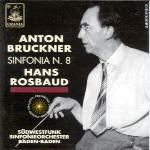Hans Rosbaud was a highly respected, even beloved figure who sadly made very few commercial recordings. So each new addition to his limited discography represents something of an event. You really root for it to be special. Hänssler has access to the Südwestfunk archives now, and hopefully will use the opportunity to release the best of Rosbaud’s efforts (and Ernest Bour’s too). Until then, we have nothing but random, pirated releases such as this (well, maybe not exactly pirated since the 1951 broadcast date, if true, makes this recording public domain). Unfortunately, like most German orchestras in the immediate post-World War II era, the Baden-Baden band was just bad for much of the 1950s, though as with so many orchestras (as a colleague of mine once quipped) they reserved their truly worst work for Jascha Horenstein’s appearances. Still, Rosbaud left us an excellent Bruckner 7 on Vox, and hope springs eternal.
So much for hope. This recording of the Eighth is a disaster. It’s very fast–faster, actually, than the orchestra can play it–that is, to the extent that you can hear the orchestra through this dynamically compressed (sometimes radically so: the scherzo is all but unlistenable), dreadful 1951 broadcast. Just listen to the congealed textural mess at the fortissimo counterstatement of the first movement’s principal theme: there’s no timbral separation at all between low strings, trombones, tubas, and horns. But mistakes from the brass section, of which there are plenty, especially in the slow movement, somehow miraculously cut through the texture with startling clarity, while the quick tempos, especially in the first and last movements (what a disappointing coda!), make it impossible for the players to observe Bruckner’s dotted and double-dotted note values with anything like the necessary precision.
The one movement that isn’t rushed, the Adagio, suffers from more than just bad playing and recording. There’s a huge, I mean huge cut of about 10 minutes of music, beginning just before the second appearance of the chorale theme on Wagner tubas, and skipping straight to the coda. This eliminates the movement’s principal climax (and several subsidiary ones), as well as the lovely return of that consoling string cadence backed by luminous harp arpeggios. It’s hard to say whether or not this was intentional, or a result of the poor quality of the source material. Unfortunately the musical evidence supports the former, as the cut does make a sort of sick musical sense: the movement’s coda begins with a major key version of the sequence being developed just before the excision. I can’t imagine even the most rabid Rosbaud fan getting any pleasure out of this sad affair, but then again, rabid fans of anyone don’t really care about music, do they?
































